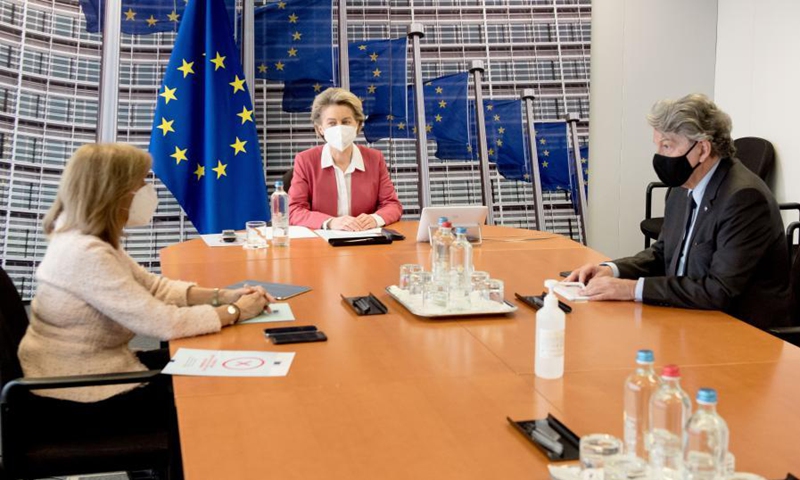Row with pharma firms subsides as more doses pledged
The European Union (EU) put on a brave face Monday, defending its troubled vaccination program and insisting that renewed pledges of vaccine deliveries would make up for a production shortfall.
Pharmaceutical giants have scrambled to ramp up production and deliveries as Chancellor Angela Merkel held talks in Berlin with German political leaders and vaccine makers, while anger grew over the EU’s sluggish inoculation campaign.
The virus is known to have infected almost 103 million people worldwide so far – with more than 2.2 million deaths – and countries are desperate to move ahead with vaccinations and lift economy-crippling restrictions.
A new study showed that COVID-19 treatments and improved hospital care had reduced death rates in intensive care by more than a third, but warned that this progress might be stalling.
New, more contagious virus variants have also added pressure, with Lithuania on Monday becoming the latest country to detect a case of a strain that first emerged in Britain.
Britain, meanwhile, said it would increase testing for a variant first detected in South Africa after nearly a dozen cases were confirmed.
Delays have dogged both the procurement and rollout of vaccines in the EU, and Merkel has come under fire for allowing the European Commission take the lead in securing vaccines for the 27-nation bloc.
But Germany’s BioNTech and its US partner Pfizer said Monday that improvements in their production capabilities would allow them to speed up supplies, pledging to send 75 million doses in the spring.
European Commission chief Ursula von der Leyen said Sunday that AstraZeneca will also boost shipments of its vaccine to the EU – although it would still ship less than foreseen in its initial agreement with Brussels.
Chemicals giant Bayer, meanwhile, announced that from 2022 it would produce a coronavirus vaccine that fellow German pharmaceuticals company CureVac is developing.
The pledges came hours ahead of the talks in Berlin, where Merkel said there are “good reasons” the EU’s rollout had got off to a slower start, such as avoiding rushed emergency approvals and lengthy negotiations with pharma companies.
European Commission President Ursula von der Leyen (C), European Commissioner for Health and Food Safety Stella Kyriakides (L) and European Commissioner for Internal Market Thierry Breton attend a video conference in Brussels, Belgium, Jan. 31, 2021. The European Union’s (EU) top health officials held discussions on Sunday with drug giants about rapid development and production of vaccines specially against the new variants of the coronavirus. (European Union/Handout via Xinhua)




